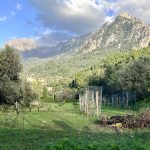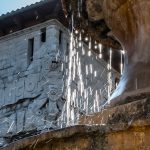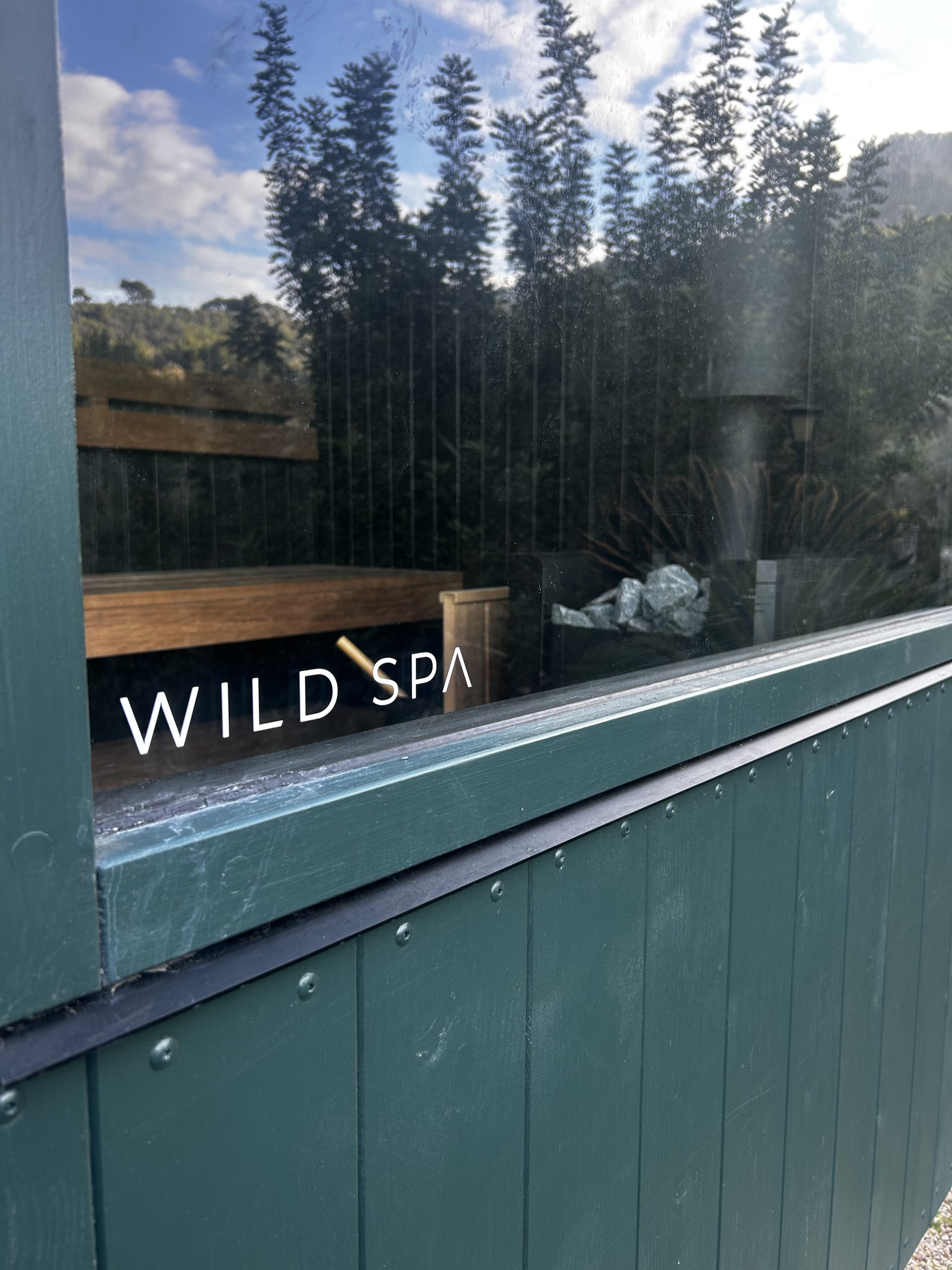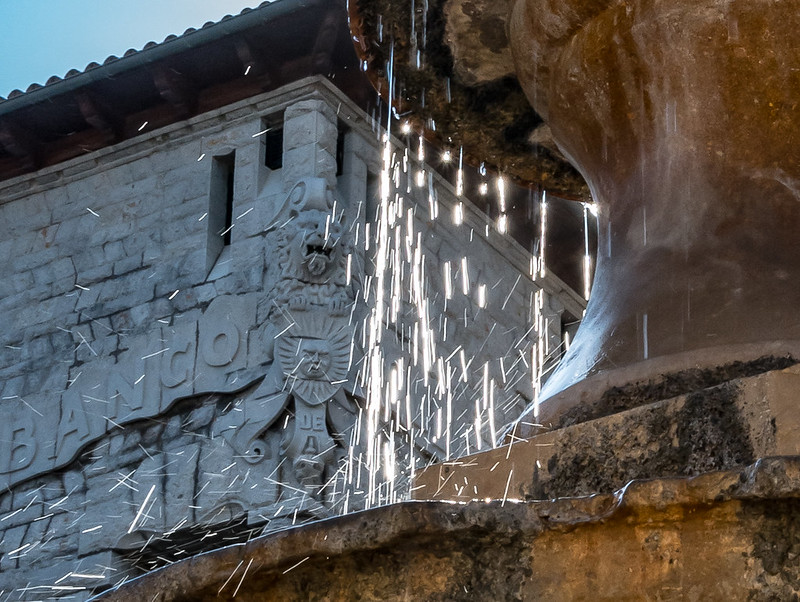Luke Rhinehart of DICE MAN fame
Lived in Deia when he wrote the book. He, and his family had many adventures living here and this story is Ann’s story from the sea…
Ann Cockcroft is a brilliant author in her own right and Luke’s wife.
Luke Rhinehart
We drifted, slammed, vomited, stared, listened to a weather report, tried another position fix, and suffered through another night; and then another day and yet another night, the force seven to nine mistral unrelenting. Once, I had a vision of sitting inside a mess hall around a large table talking and joking to our rescuers. I dismissed it as a dream.
But, ten days later, gaunt ghosts and shell-shocked, we arrived back in Deia to tell it all.
In the summer of 1970, having just finished writing the first draft of THE DICE MAN, my insane sailor self took control of my body and had me buy a catamaran with most of my lifetime savings and cruise the Mediterranean. Chance, ever on the lookout, then got us caught in the middle of one of the worst Mediterranean storms in decades. Then Chance, ever fickle, with hundreds of chances to finish us off, shrugged and let us survive.
I have written about this adventure, but not as well as my wife Ann. She (the author of three novels and a marvelous book of poetry) has written a dramatic and moving account of those five days. Here it is:
“CATINA” IS LOST
“That’s an incredible story,” a friend said as she listened to my story of our whole family almost dying when caught in a storm in the Mediterranean. “You ought to write it down just as you’ve told it to me.”
I had in fact tried writing it once before and got three pages into it and stopped. The writing was painful. The emotions and scenes came back too slowly; stirred emotions that upset me. Only now and again some detail would come back focusing the terror more than others– like the realization that the engine was dead, the wind getting stronger; that it was eleven o’clock our first night at sea anywhere, and my husband was exhausted and going to sleep, urging me to sleep also, but I insisting we must keep watch, take the helm, my heart pounding in nervousness and fatigue. Were we in a shipping lane? Could we maneuver out of the way if a ship bore down on us? Dare I go to sleep? I didn’t know it then, or perhaps I would have tried to sleep a few hours, but I was not to sleep, not relax my vigil, for four long days.
But today I try again to tell the story.
We had bought a 30 foot Catalac catamaran named “Catina” in the French Riviera town of Antibes, and with our three boys had sailed east along the French cpast and then east and south along the Italian coast, and finally across to Corsica and Sardenia. We were on our way back to Mallorca, where we had lived for a year. We were to meet George’s brother and his family who were joining us for a vacation and George’s publisher, who was coming to Deia to work with George on revisions to my husband’s first novel THE DICE MAN. We told everyone we’d be back on or before July 16th.
From the moment we left Deia, Mallorca, to take a ferry to take possession of Catina I had felt uneasy, feeling brief bursts of foreboding. But we had all enjoyed the cruise when we arrived in the little port of Stintino, in the Northwest corner of Sardinia, our last stopping point before we set sail across the Mediterranean to Mallorca. A beautiful sunset our final day in port gave way to an even redder dawn. We spent our last dollar on extra tanks of gas for the outboard, food, and what charts we thought we would need. We had plenty of everything. We called the local airport for the latest weather information: all clear for two days,
But despite this, in Stintino I was struck by a terrible foreboding, a premonition of disaster that was much greater than the vaguer anxious worries I’d had earlier. The feeling of foreboding was so strong that I made desperate efforts to see if I couldn’t find a way for me and my two younger sons, only 4 and 7, could get a boat or plane to Mallorca. None seemed available. On the morning we were to set sail in clear calm weather for Mallorca, although I hadn’t been in a church in years, I found a small white chapel near the dock, and prayed passionately for our safe return. I forgot to include the boat.
We cast off in a dead calm. I would have preferred a slight breeze with ripples instead of the mirror before us. I knew we had gas enough to take us three-quarters of the way across and we were bound to get some wind sooner or later. These facts reassured me only as long as it took to announce them.
Our three boys, the oldest almost 12, were delighted with their new surroundings. They would spot something in the water and get George to motor over to it against my protests. “Let’s not waste time,” I pleaded. What was I afraid of? A giant sea turtle lazily sunning itself? Or a school of frolicking dolphins? An old Italian fisherman might have recognized signs of an approaching storm. All I had were my inner knots.
At noon, the outboard, which had been pushing us steadily westward all day, began to skip and lose power. During the next four hours we stopped the boat three times to let the boys swim and permit my husband to check the rapidly failing engine. It could run at full r.p.m. in neutral but would stall if asked to push the boat at much more than a crawl. We began changing sparkplugs, draining the fuel line, rechecking our mixture. What else? Engines were a mystery and a pain. We drifted sluggishly.
At dusk we finally got some light wind. Feeling relieved, we raised all sails and were on our way again, if only at two knots.
About ten my husband said he needed rest and that we should all turn in. He’d set a course, tie the tiller and let the boat sail herself.
“What about ships?” I asked.
“Not likely,” he answered.
After a brief discussion of my fears, we finally agreed to spell each other on watches. His innocent faith that the world would shelter us from whatever could happen in it, distressed me. I felt I must do the superhuman act now, if it was only watching for freighters.
Very tired but determined, I took the first watch lining up the moon with the mast and holding course that way with periodic checks on the compass. Everyone below fell asleep as we sailed in a light but steady breeze. When I checked the time hoping I could give up the watch, I couldn’t believe it was only eleven o’clock. I had been fighting so hard to stay alert it seemed that hours had passed. Finally at midnight, I called to our twelve year old, Corby, to take over.
“The wind seems to be increasing,” I reported as I lay down beside my husband.
“Good,” he said, “We’ll get there faster.”
Although I lay still, my frequent checks to see if Corby was managing kept us all awake. Finally, George got up to take over, thinking that was the only way I would get some rest.
All that night as the wind gradually freshened, the moment sleep would be upon me I would waken with a start, frightened, aware of fathoms of water under a frail wooden structure.
My husband remained at the helm all that time, enjoying the first good sailing. When at dawn he called me to the wheel I saw that the seas were beginning to build. We began flying along at five or six knots, about as fast as the chubby Catina, “The Tub” as I had dubbed her, would go.
Listening to a weather band in French, my husband heard an alarming report. Violent winds coming down from the French Alps had produced uncontrollable forest fires in southern France and gales at sea. It was a mistral. “All small ships should head to port.”
We were midway to Port Mahon, Menorca, over 100 miles from land in every direction. We had trusted our lives to Catina and now, with the engine gone, we had to sail and we didn’t know what it would take to capsize her.
By noon, George was straining hard to keep her on course and had just agreed with my suggestion to take down the mainsail when suddenly he called out: “Drop all sails!”
Corby and I leapt to the mainsheet and jib halyard and tied the sails hurriedly. George dropped the mizzen and Catina began rolling helplessly broadside to the swells.
The cable leading from the twin rudders to the wheel had snapped, leaving the rudders luffing like windless sails. While my husband quickly jury-rigged a repair, I instructed the three boys to put on life jackets.
Although the repaired cable was loose and gave us much less steering control, George decided to try raising the mizzen and reefing the jib in an effort to go forward towards Menorca and to better control the boat, but after another two hours of perilous tipping, we dropped all sails and hove to. In lowering the jib, one arm around the mast, I lost control of the jib halyard and it dangled swaying in great arcs high above our heads. Rescuing it became dangerous. It would have to wait.
I kept the children up on the decks as much as possible feeling they were safer there if Catina should capsize. The four and seven year old boys invented a game choosing who had which big wave and whose was the biggest.
Our next enemy approached fast: seasickness. He who went below or tried to eat saw his food again in a new form. It didn’t hit George until the next morning and I, neither eating nor sleeping, never succumbed; fear being one of the antidotes of seasickness. Corby quietly curled up in his bunk and began reading Chichester’s “The Lonely Sea and the Sky,” the story of his circumnavigation when he was in his late sixties.
As night came down, my husband half-swamped our inflatable dinghy and tied her aft as a sea anchor. The seas now seemed enormous. In the troughs we had no horizon. On the crests we saw only other crests. Combers were curling on the wave tops. The first one that hit us, turning Catina dangerously with her beam to the waves, made us finally think we might never return. Out of our high windows in the main cabin we could see only water. Every twentieth comber slammed into us so hard the entire contents of magnetized drawers spilled–books, pots, pottery and clothes sloshed and bumped on the cabin floor as in a bucket. We stowed what we could, and began huddling on the windward side that took the waves, hoping the extra weight would save her from going over. Catamarans do not right themselves.
I was unable to think at all except of how we would try to get out of the upside down boat in the event we did capsize. Four year old Chris couldn’t swim. His helplessness made me frantic. At night, unsleeping on the windward side of our bunk, I felt terror as every fourth or fifth wave smashed into the hull near my head with a thunderous crash that felt like it would be fatal. I urged Catina with every thought to right herself after each slamming.
The cabin reeked of vomit, and the wind did a jig in the halyards and howled through the shrouds. During the day each comber that smashed brought us to our feet staring out the window. It didn’t seem possible we could be tilted so far over or smashed so hard without going over.
Somehow Catina brought us through the night. Reassured, my husband concluded that, barring a freak wave or accident, Catina could make it, but out on deck, he discovered two new disasters: our dinghy was gone and one of Catina’s twin metal rudders had broken off. By now George was desperately fatigued and the effort of getting tools and wood to try to jury rig a rudder made him violently seasick.
We knew now we needed help. We sent up a flare to signal the next ship we saw in the distance, but succeeded only smudging the decks with black and burning my husband’s hand.
George then painted a large S.O.S. on our topside, and I went below to cut up a white sheet and crayon a big red X on it. The first such “needing assistance” flag wound itself tightly up and refused to unfurl. I crayoned a larger flag. It flew. My husband’s plan was to have me and the two young boys taken off the boat while he and Corby brought her home, a plan I was not happy with.
We were beginning to look like a besieged ship. We were: by a Mediterranean mistral that was the worst in a decade.
It was sometime about then that George seemed to lose heart. He began apologizing to me for getting us into this probably fatal mess and saying some loving farewells. He jokingly promised he’d never make the same mistake again.
We drifted, slammed, vomited, stared, listened to a weather report, tried another position fix, and suffered through another night; and then another day and yet another night, the force seven to nine mistral unrelenting. Once, I had a vision of sitting inside a mess hall around a large table talking and joking to our rescuers. I dismissed it as a dream.
On our fifth day at sea around noon, when George was out on deck trying to put pieces of a rudder together, a British freighter bore down on us. I almost didn’t believe it. The boys came up on deck and we waved. The big ship began circling us and a voice from a megaphone asked what assistance we needed. My husband briefly stated his case, still hoping to stay on Catina with our twelve year old son.
Now began a series of maneuvers as frightening as everything else had been. The freighter circled to windward of us and shot out a long line. The first pass of an enormous rope wound around Corby’s leg and began dragging him off the boat before my husband cast off his end and released the pressure. The second pass fell short. My husband leapt into the sea to get it, handed it up to seven year old Powers,whose hands were rope burned as the line tore out of his grasp.
Now began a series of maneuvers as frightening as everything else had been. The freighter circled to windward of us and shot out a long line. The first pass of an enormous rope wound around Corby’s leg and began dragging him off the boat before my husband cast off his end and released the pressure. The second pass fell short. My husband leapt into the sea to get it, handed it up to seven year old Powers,whose hands were rope burned as the line tore out of his grasp.
The freighter “Courland” warned us to stay on board. Finally they got a line to us. The huge screw turned and bobbed within yards of us. Its grey hull loomed thirty feet into the air, then sank to within feet of our deck as we seesawed precariously together. At one point the Catina’s aft cleat pulled out leaving a gaping hole in her deck.
The Scottish captain instructed the children and me to remain on deck while he and my husband, who was topside near the mast, began a discussion of what was wrong with Catina. As George again stated his desire to stay with the boat—he later said he’d read too many romantic sailing adventures–I jumped into action. I climbed onto our cabin top, grabbed the freighter’s ladder and scrambled upwards. Helped aboard, I pleaded hysterically:
“Get my husband off that boat!”
Listening amazed, the crew and my husband quickly brought up one child after another. Asked about the boat’s problems, I listed the wreckage, and begged again, as they led me protesting away to the first mate’s cabin for tea, “get my husband off that boat! I don’t care what you do with the boat, only get my husband off!”
Twenty minutes later, I learned that the Courland’s Captain had informed George that the mistral was going to continue into another day and at Catina’s rate of drift, our boat would be on the rocks of a hostile and unpopulated Algerian coastline about midnight. He advised George to come aboard the freighter and they would attempt a tow. My husband reluctantly agreed to make fast a steel cable around the base of Catina’s mast and handed up what of value he could find and climbed aboard. Lost in the shuffle were our camera and rolls of exposed film, two passports, my summer’s log and poems, some manuscript pages of THE DICE MAN, and too many things to mention that make one’s personal world . All drifted off behind the “Courland” in Catina’s belly.
Twenty minutes later, I learned that the Courland’s Captain had informed George that the mistral was going to continue into another day and at Catina’s rate of drift, our boat would be on the rocks of a hostile and unpopulated Algerian coastline about midnight. He advised George to come aboard the freighter and they would attempt a tow. My husband reluctantly agreed to make fast a steel cable around the base of Catina’s mast and handed up what of value he could find and climbed aboard. Lost in the shuffle were our camera and rolls of exposed film, two passports, my summer’s log and poems, some manuscript pages of THE DICE MAN, and too many things to mention that make one’s personal world . All drifted off behind the “Courland” in Catina’s belly.
We all stood together finally at the stern of the freighter to catch what was our last glimpse of sailboat home which, being pulled at ten knots, hurtled off at angles in the violent seas. Up a wave she went and then capsized. In a few minutes, her mast pulled out, was cut loose, sank, and Catina, her twin red hulls bouncing, wallowed slowly off to her death. The boys wailed. George watched haggardly the end of our summer cruise. I was numb and too grateful we all survived to feel sorrow for the boat. Periodically I have had stricken images of her sinking, dashed to bits against the rocks of Algeria. Pieces of us still lived in that craft.
The epilogue is long, too long. The freighter’s captain told us his next port of call was O Porto, Portugal, and it would be a week or more before we could get back to Mallorca. He tried to radio a message to Deia to tell people that we were alive and well but no one in Deia ever got the message (primitive times back then, no cell phones, etc.). Our relatives arrived to an empty apartment, no word from us. A friend in Deya, an ex-navy man, judging the mistral and our delay, never expected to see us again. George’s agent-publisher came and left, unhappy to be involved with a posthumous author.
But, ten days later, gaunt ghosts and shell-shocked, we arrived back in Deia to tell it all.








